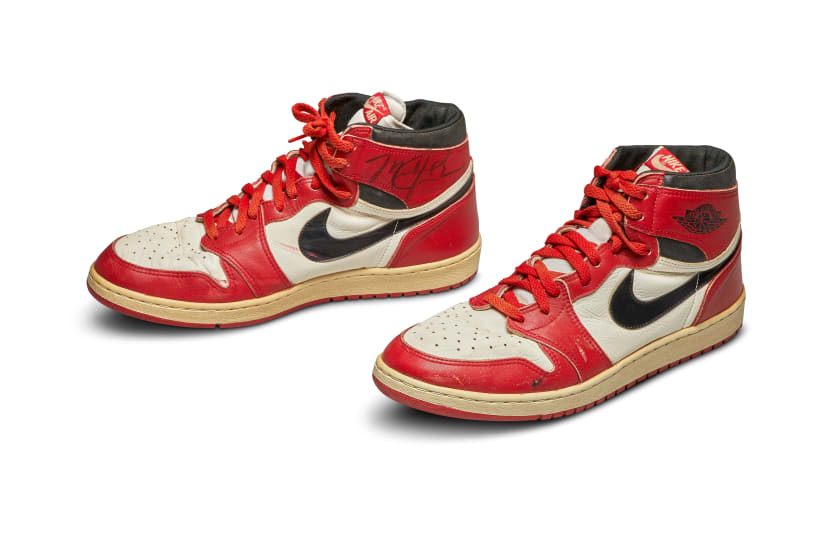As a child of late 1980s and early 1990s America, I grew up a Michael Jordan fan. I wasn’t your run-of-the-mill “Be Like Mike” fan, I was named Nike’s Air Jordan Flight Club’s third greatest Michael Jordan fan in the United States.
I would beg my parents to buy me the newest version of Air Jordan sneakers every year, so it’s only fitting that my 13-year-old son is now putting me through the same torture and begging me to buy him the same overpriced sneakers.
I tried explaining to my son how irrational it is to buy sneakers at a premium price, not for quality, but image – our talk got me nowhere, he still wanted the Air Jordans. I relented, but not without a fight. I challenged my son that if he earned a perfect grade on his next Talmud test, I’d buy him the pair of sneakers of his choice.
My son met the challenge, earned his perfect grade, and went with his mother shopping for sneakers. I was a proud father. I had successfully motivated my teenager to get off his computer, study, and earn a high grade on a test. I also knew that my son’s inner genius was being revealed!
I was more than a little disappointed when I saw the sneakers he had chosen. Although he lives in a desert that can muddy any sneaker, he had chosen purely white sneakers.
While bemoaning to friends how his sneakers would be ruined within a day, and maybe my son wasn’t the forward thinker I thought he was, Robin, a friend, commented that I should allow him to enjoy his sneakers because soon he’ll trade them in for army boots.
Robin’s comment turned a slightly humorous incident into an opportunity to reflect on raising a child in Israel. I haven’t had a child serve in the Israeli Defense Forces yet, my three oldest children opted for national service. There is a unique pride parents of IDF soldiers experience.
However, there is a much less talked about fear these same parents suffer. When I look at parents whose children are serving in the army, I can’t pretend to imagine the combined worry and pride they feel. Although I don’t know what it means to have a child serve in the army, I’m anxious knowing the day will come.
It’s ironic that Zionist parents worry about their children in the Israel Defense Forces. Zionism aimed to establish a means for Jews to defend themselves in strength. No longer would the Jewish people be at the whim of their hosts, Jews would defend themselves from their enemies. The image of a strong sun-kissed Israeli soldier standing guard over the Jewish homeland was a dream early Zionists felt was tangible – if only they worked hard to achieve it.
NOW THAT we’ve established our state, formed an army, and successfully fended off our enemies multiple times, we would think parents would only experience joy and pride at their children serving. Any Israeli parent will tell you the joy is tempered by the worry of the unknown and the unthinkable.
In his description of Israel’s Memorial Day juxtaposed with Israeli Independence Day (the days follow each other), Israeli battle veteran and current Minister of Communications Yoaz Hendel wrote in Zionism, not Cynicism (April 2015), “the link between sorrow and joy is part of the complex story of life in Israel, of what we are: A part of what allows Israelis to be patriotic and critical in the same breath, to wear army boots on reserve duty and flip-flops to work the next day. A foreigner wouldn’t get it. I’m not even sure that we do.”


The confused desire of the Jewish people to have their own army while simultaneously fearful of their children serving in harm’s way can seem like cognitive dissonance, but it’s the embodiment of the duality of the Zionist dream. Zionism spoke to the Jewish aspirations of land all our own, where Jews can live in peace, and wear their foolish white sneakers. This was the Zionism of dreams. The other Zionism was the realist Zionism; where soldiers would need to wear boots, put themselves in danger, and defend their homeland.
These dual notions of Zionism exist simultaneously. The Israeli Declaration of Independence stated, “The State of Israel will be based on freedom, justice, and peace, as envisaged by the prophets of Israel,” and former prime minister Ben-Gurion further stated, “Our security lies in constantly building up our strength in every area and on all fronts.”
The Zionist goal of a free, safe, and peaceful Jewish State belonged to the dreamers and the realists, and the two don’t contradict. Having a state that exists on two contradictory planes simultaneously is the miracle of today’s Israel. It is a land of dreams bolstered by the reality of the dangers that surround it and the security required to ward off those lurking dangers.
This miracle isn’t just the Israeli people’s accomplishment. It is only with God’s help, the special Divine Providence promised to the Jewish people and on their land, that can fully explain the miracle of modern Jewish existence.I am cognizant, but not really understanding, that one day my son will have to remove his sneakers and trade them in for IDF-issued boots. I know this will be a transformation for him, me, and our family.
I am also aware that he’ll be lacing up his IDF boots in order to make sure another Israeli boy can study for his Gemara test, earn a perfect score and buy his own ridiculous white sneakers.
I’m living the Zionist dream, and while it might be confusing at times, it is a 2,000-year-old dream fulfilled and I’m grateful for every moment.
The writer is the senior educator at Nefesh B’Nefesh’s Zionist Education Initiative. He is the author of three books and teaches Torah, Zionism, and Israel studies around the world. He is married with six children and lives in Mitzpe Yericho.
